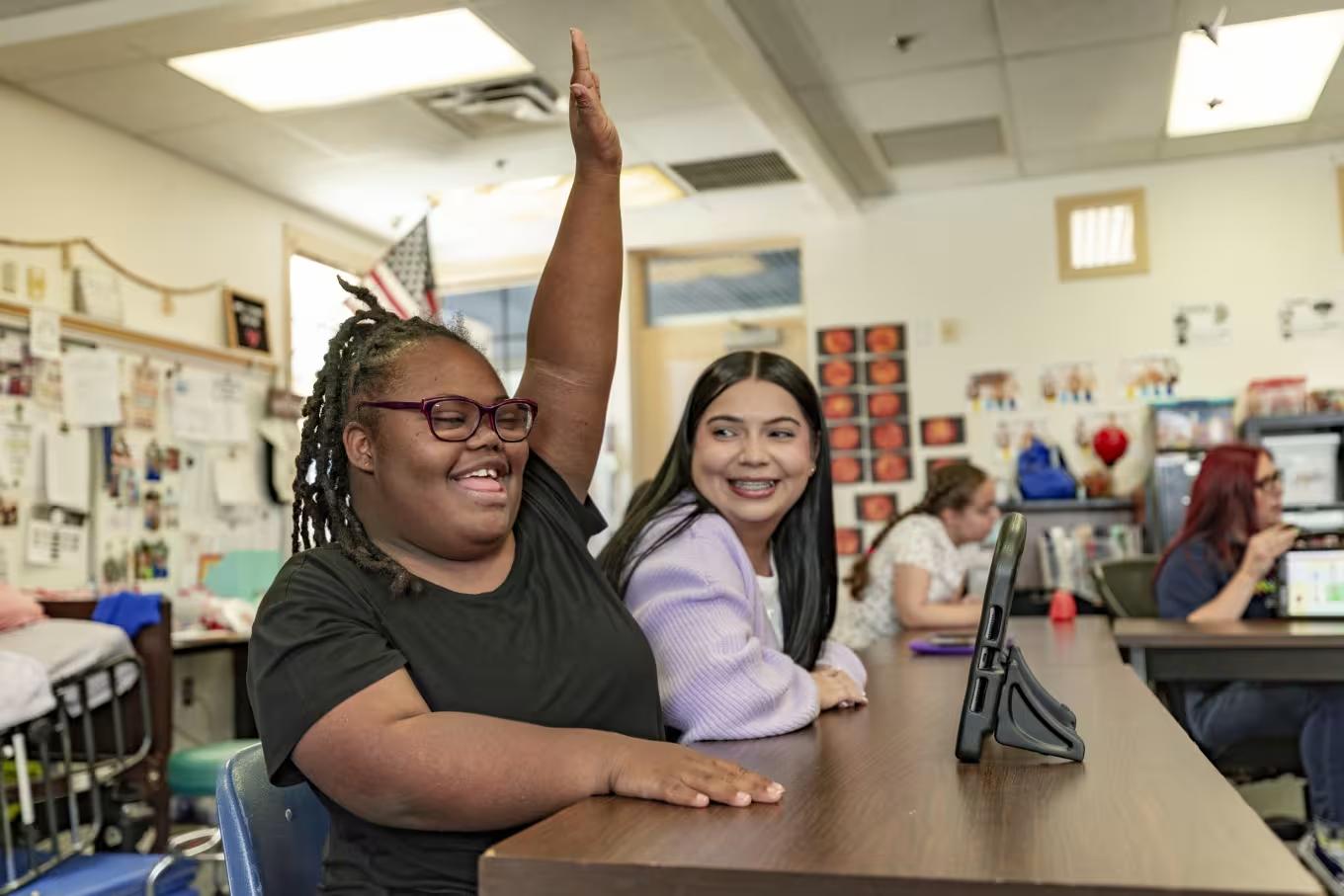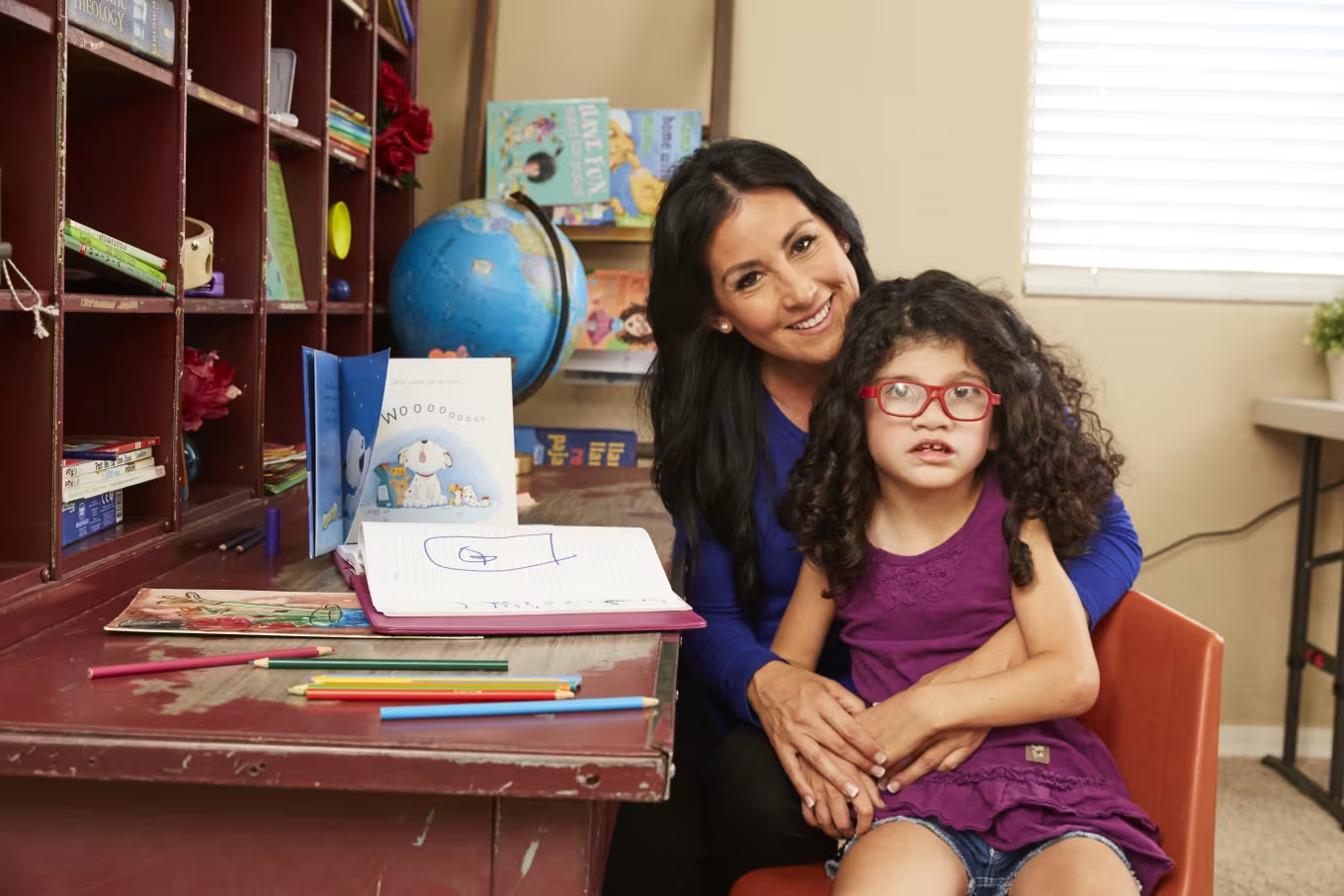Bachelor of Science in Elementary Education and Special Education

Bachelor of Science in Elementary Education and Special Education
journey today.

We're here to help.
By earning a specialized education bachelor’s degree, you might apply for employment opportunities within the following settings:1,2
Median annual wage for special education teachers as of May 20233
Many educators find elementary and adaptive education to be a calling that allows them to serve their community and nurture the next generation. Upon graduation, you may decide to pursue work as a pre-K-12 special education teacher or a special education teaching assistant. Each state has different requirements, so be sure to check with the state department of education in the state where you plan to teach to ensure you meet all licensure requirements.
The Association for Advancing Quality in Educator Preparation (AAQEP) is a national accrediting organization that has been recognized by the Council for Higher Education Accreditation. GCU is proud to be a member in good standing of the AAQEP, with many education degrees accredited by the organization, including the Bachelor of Science in Elementary Education and Special Education. This designation is awarded to a degree program found to effectively prepare educators to deliver instructional excellence for their students.
GCU is an institutionally accredited university that prioritizes academic quality across all our colleges and programs. In addition, the Higher Learning Commission has continually accredited GCU since 1968. The College of Education shares the university’s commitment to upholding the principles and standards established by our accrediting bodies.

Prepare to make a difference in the lives of young students with exceptionalities.
Key Concepts in this Dual Teaching Program
Both elementary and inclusive education teachers need to be fully equipped with pedagogical knowledge and instructional techniques to support their students. This dual program teaches critical concepts, such as:
Elementary students and students with exceptionalities deserve teachers with excellent pedagogical backgrounds to teach and advocate for them. Faculty teach specialized education courses in the areas of learning disabilities, emotional and behavioral disabilities and other physical and cognitive impairments.
You will complete a full-time, 16-week student teaching component at the end of this degree program. The first eight weeks of student teaching take place in a general education setting. The second eight weeks are completed in an inclusion classroom, resource room or self-contained classroom, serving students with mild to moderate exceptionalities. You will complete your special ed student teaching experience under the supervision of a certified special educator.
Upon graduation, you may qualify for a teaching certificate. Additional testing, practicum hours or experience may be required to attain elementary or specialized education teaching licensure.
As a future educator in this bachelor’s degree program, you will be taught:
Classroom management
Collaboration with general elementary education teachers (mainstreaming support)
Adaptive learning for the least restrictive environment
Personalized learning strategies for student achievement
Assessment strategies
Developmentally appropriate pedagogy
Classroom management
Collaboration with general elementary education teachers (mainstreaming support)
Adaptive learning for the least restrictive environment
Personalized learning strategies for student achievement
The Bachelor of Science in Elementary Education and Special Education at Grand Canyon University is a dual degree program that leads to licensure. The program includes coursework designed to prepare future educators to teach in elementary settings, as well as coursework that is required of teachers working with mild to moderate exceptionalities in the K-12 setting.
This program is comprised of both pedagogical knowledge and specialized education content. Examine best practices in working with K-12 students with mild to moderate disabilities, including the implementation of Individualized Education Programs (IEPs) to accommodate students’ various learning, behavioral and social needs. Through this comprehensive licensure program, you can pursue your passion for helping students reach their full potential.

Before choosing an education degree program, it’s wise to take a moment to reflect thoughtfully upon your career goals and academic options. GCU has compiled the following FAQs and answers to help guide your decision-making process.
You will typically need a minimum of a bachelor’s degree with a focus on education or inclusive education to become a teacher for students with exceptionalities. Along with a degree, you will also need to gain experience hours in the classroom. This may be included as part of your bachelor’s program and is required for certification or licensure. Lastly, you will need to review your specific state’s certification or licensure requirements needed to obtain licensure before you begin teaching. Requirements will vary by state and institution, but all states require public school teachers to be licensed or certified.4
According to the U.S. Bureau of Labor Statistics, special education teachers have a median annual wage of $65,910 as of May 2023.3 While the number of months may vary depending on the type of organization you’re working for, an inclusive education teacher typically will work a 10-month school year and have a two-month vacation in the summer.5 This can be appealing for those looking to stray away from a traditional year-round work schedule.
With the flexibility and convenience of online learning, you can examine essential knowledge and specific teaching skills to work toward teaching students with exceptionalities. Designed for those unable to attend in-person classes, online bachelor’s programs offer the same curriculum as traditional on-campus programs. They require dedication and hard work to progress through the curriculum and pursue options in the field.
According to the U.S. Bureau of Labor Statistics, employment of special education teachers at the kindergarten and elementary school level across the U.S. is highest in Texas, California, New York, Illinois and New Jersey, while states including New Mexico, Alabama, Wyoming, Idaho and Montana rank at the lowest levels of inclusive education teacher employment.6
Qualified elementary and special needs educators are charged with empowering and inspiring students to achieve their education goals. As a future teacher enrolled in this bachelor’s program, you have the opportunity to guide and nurture children while confidently navigating the changing landscape of inclusive education laws and procedures.
At GCU, our biblically rooted curriculum infuses the Christian worldview directly into the coursework. There is a focus on professional ethics and the application of biblical principles to modern ethical dilemmas. Our Christian university strives to graduate work-ready teachers who are prepared to tackle any challenge presented by the modern educational landscape.

If you are seeking licensure/certification, please refer to the Accreditation and Compliance/State disclosures link for the specific program of interest’s website for your location and/or employment state licensure requirements, per 34 CFR 668.14(b)32 and 668.43(c).
1 U.S. Bureau of Labor Statistics. (2024, April 17). Special Education Teachers: Work Environment. Occupational Outlook Handbook. Retrieved May 28, 2024.
2 U.S. Bureau of Labor Statistics. (2024, April 17). Kindergarten And Elementary School Teachers: Work Environment. Occupational Outlook Handbook. Retrieved May 28, 2024.
3 The earnings referenced were reported by the U.S. Bureau of Labor Statistics (BLS) Special Education Teachers, as of May 2023, retrieved on June 5, 2024. Due to COVID-19, data from 2020 to 2023 may be atypical compared to prior years. BLS calculates the median using salaries of workers nationwide with varying levels of education and experience. It does not reflect the earnings of GCU graduates as special education teachers, nor does it reflect the earnings of workers in one city or region of the country or a typical entry-level salary. Median income is the statistical midpoint for the range of salaries in a specific occupation. It represents what you would earn if you were paid more money than half the workers in an occupation, and less than half the workers in an occupation. It may give you a basis to estimate what you might earn at some point if you enter this career. Grand Canyon University can make no guarantees on individual graduates’ salaries. Your employability will be determined by numerous factors over which GCU has no control, such as the employer the graduate chooses to apply to, the graduate’s experience level, individual characteristics, skills, etc. against a pool of candidates.
4 U.S. Bureau of Labor Statistics. (2024, April 17). How To Become A Special Education Teacher. Occupational Outlook Handbook. Retrieved May 28, 2024.
5 IResearchNet. (n.d.). Special Education Teacher Career. Retrieved May 28, 2024.
6 U.S. Bureau of Labor Statistics. (2023, May). Occupational Employment And Wages, May 2023, 25-2042 Special Education Teachers, Kindergarten And Elementary School. Occupational Employment and Wage Statistics. Retrieved May 28, 2024.
Up to 90 credits, only 84 can be lower division
Credits: Fill out the Lopes Eval to find out what will transfer
Admission Requirements (Bachelor's)
OR 2.5+ Unweighted GPA and
Admission requirements may differ based on degree level, program and modality, or transfer status. Some programs of study may require a higher GPA and/or other qualifying criteria for admission. Please review full admission and program requirements in the University Policy Handbook.
*Math and reading only on a 1600 point scale (test date after 3/1/2016). SAT score of 1380 required for 2400 point scale (test date before 3/1/2016).